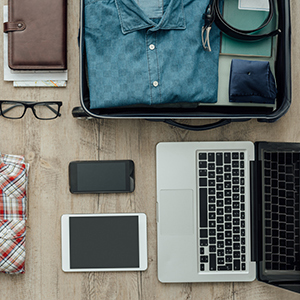Last updated: May 15, 2025
 Ensuring the Safety of Information and Devices While Travelling
Ensuring the Safety of Information and Devices While Travelling
It is crucial to prioritize the security of your electronic devices while travelling abroad by safeguarding your personal and sensitive information, and confidential or high-risk UBC information.
Here are some essential security tips to ensure a safe and worry-free travel experience

Before Your TripBefore Your Trip
Take these steps to secure your devices
Step 1 - Be prepared
- Review the Government of Canada's Travel Advice and Advisories page
- Filter by your destination
- Take note of the current risk level for that country
 | Take normal security precautions | Exercise a high degree of caution |  | Avoid non-essential travel |  | Avoid all travel | |
(More details about the risk levels) | |||||||
Step 2 - Actions to take for all travel
- Ensure that your devices are encrypted
Please note: some countries do not allow encrypted devices. Canada requires an export license for encrypted devices for some countries; other countries ban or severely regulate the import and use of encryption devices. - Review UBC's Security Considerations for International Travel With Mobile Devices
- Lock your device with a strong PIN, passphrase, or password
- Enable multi-factor authentication on all your accounts
- Remove unnecessary data, apps, and payment methods from your devices
Step 3 - For countries that require you to Exercise a high degree of caution, consider using a "loaner device"
- Speak to your local IT Helpdesk to see if this is possible
During Your TripDuring Your Trip
- Review the Government of Canada's recommendations on Remaining Cyber Safe While Travelling and the Potential Risks of Using Devices During Your Travel
- Turn off automatic connection features on your devices to prevent them from connecting to unknown or potentially unsafe networks without your knowledge.

- Regularly monitor your electronic devices for any signs of unauthorized access, unusual behavior, or suspicious activity.
- Avoid using public Wi-Fi networks for sensitive activities such as online banking or accessing personal information.
- Use a Virtual Private Network (VPN) whenever possible for added security when connecting to public Wi-Fi networks.

After Your TripAfter Your Trip
- If you borrowed a loaner device, return it to the IT Department and explain that you have just returned from an international trip so the loaner needs to be wiped and reset before reconnecting it to the UBC network.
- Change the passwords and PINs on any devices and accounts you used on your travels.
- Stay diligent. Many people report an uptick in targeted phishing and fraud attempts after travelling.
- Watch your credit card statements for any unusual activity and report these immediately to your credit card provider.
- Report any suspected security incidents to UBC Cybersecurity by emailing security@ubc.ca.

Further Technology Guidance
Encryption
- Some countries do not allow encrypted devices.
- If you are travelling to a country where encryption is not allowed, you should take unencrypted loaner devices with no UBC information stored locally on that device.
- Microsoft Teams and Outlook should be removed; email should be accessed via web browser, and consider emailing important links to yourself so that they can be accessed via browser if needed.
- Review the Security Considerations for International Travel With Mobile Devices security guideline for more information.
Data & Applications
- Remove sensitive information from your work laptop; remember that OneDrive creates a local sync copy on your hard drives.
- Depending on your travel destination you may want to consider removing sensitive apps (e.g., Microsoft Teams, UBC email).
- If you need to install local apps like WeChat or AliPay to get by, do so before travelling, and use a unique passphrase or complex password. Uninstall them promptly after use.
- Disable features like Bluetooth and wireless headsets when not in use.
At the Border
- Border officials often have broad inspection powers, including unlocking or seeking passwords to your laptop, tablet or mobile phone.
- We recommend that travellers personally unlock their devices rather than providing passwords to authorities if allowed.
MFA Multi-factor Authentication Access
- Multi-factor authentication (MFA) is required when accessing UBC systems off-campus that utilize a campus-wide login.
- UBC utilizes Cisco Duo for MFA. Notably, the Duo mobile application functions even without a cellular data connection, ensuring continued access even in areas with limited connectivity.To safeguard against potential device loss, configuring a backup authentication method within Duo, such as an alternative mobile device, such as a tablet or security key, is highly recommended. This redundancy ensures uninterrupted access to critical UBC resources during your travels.
- Please be aware that due to the US-based sanctions that guide Duo's restrictions, individuals logging in from countries affected by these sanctions cannot access certain systems. Canada also enforces its own set of sanctions, which may overlap with US-based sanctions.
- Attempts to log into Duo MFA-protected applications from a device with an IP address in a sanctioned country will be blocked, resulting in an “Access Denied” error message.
- If you are planning to travel to a sanctioned country, contact one of the following for support:
Go Further...
- Security Considerations for International Travel with Mobile Devices
- Travel advice and advisories by destination
- Device security for travel and telework abroad
- Cyber security while travelling
- Remaining cyber safe while travelling: security recommendations
- Mobile devices and business travellers
- Information Security Standard U6 – Working Remotely